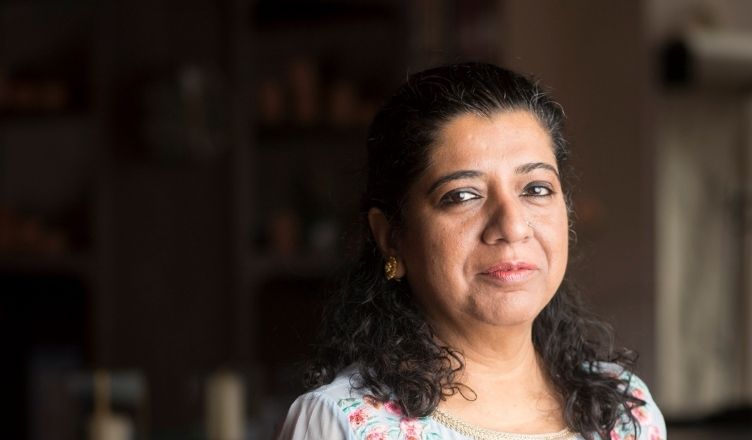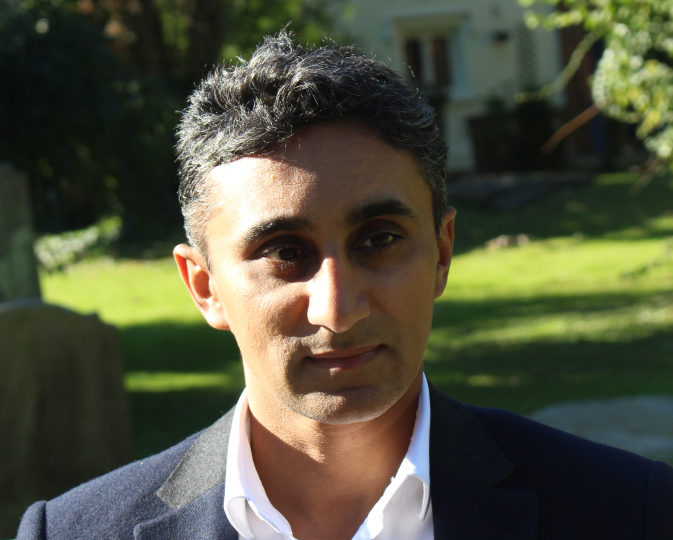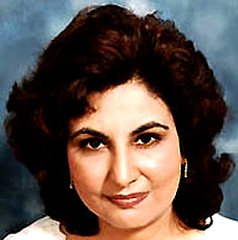Q. Firstly could you tell me about how came to writing and discovering your voice?
I have always wanted to write. Some people count sheep to fall asleep at night, I craft stories, elaborate tales with characters whom I encounter every night as I settle into bed. But I only ever treated it as a hobby, because, growing up in a small village in India in the eighties, we did not know of many writers who had made a career of their craft. We did, however know plenty of engineers who had carved respectable livelihoods. And so I studied Engineering and worked in IT even though writing always remained a passion.
I quit software altogether when my kids came along. And when my daughter started nursery, with my son already at school, I had some free time to indulge my passion. I enrolled in an Adult Education Creative Writing Course and started penning stories that I actually shared with other people instead of just inventing them in the privacy of my head. I discovered that my stories were liked, a few of them got published in magazines and won competitions and awards and that gave me the encouragement to start writing my novel.
Regarding discovering voice- my stories arrive as pictures in my head. If I can communicate the picture via words so that when I read back what I have written, it matches the image in my head, I feel I have succeeded.
Q. You secured a three book deal with Bookouture. Tell me about your journey from aspiring writer to published novelist. What have been the highlights so far?
It’s been a rollercoaster ride with so many highlights.
I had instant success with my short stories and I thought getting my novel published would be just as easy. The mistake I made, in retrospect, was to send my manuscript off too soon, before it was the best it could be. I got quite a lot of feedback: ‘Plot is weak’; ‘Cannot identify with the main characters’; ‘Structure doesn’t work’; ‘Story needs tightening’ and so on. I took all the suggestions on board, worked on the manuscript and sent it off again. This time, the feedback was unanimous, ‘We like your story but cannot take it on because of the recession, the current deplorable state of the market.’ I had almost given up when I saw the
ad for Bookouture in Mslexia and decided to send my manuscript off one last time.
Highlights – The biggest without a doubt was the email from Bookouture, waiting in my inbox on a freezing February morning, when I had switched on my email with fingers frost bitten from the trek to school to drop off the kids. The subject said just ‘Monsoon Memories Submission’. My fingers refused to bend, and after a few tries, I managed to click on the email. Please God, I was thinking. ‘We would like to publish your book.’ And then the cold did not matter, nothing did.
Other highlights have been having the wonderful Lorella Belli of the Lorella Belli Literary agency represent me; seeing the covers of my books for the very first time, both of them surpassing anything I had envisioned – I have my wonderful publisher, Oliver Rhodes of Bookouture to thank for both of them; travelling to India for the launch of Monsoon Memories over there and more recently, The Forgotten Daughter making Number 1 in the Women’s Literary Fiction Chart and also the top 100 overall in the Amazon UK Kindle chart.
Q. Your first novel, Monsoon Memories flits between the voice of Shirin and Reena. Two distinct voices. How did you go about perfecting each, and especially the child’s voice of Reena?
I occupy my characters’ lives; try to imagine what it would be like to be them. I take up residence in their head and wonder what I would do if faced with the same choices.
All the tomes on writing advice you to write about what you know and with Shirin, the protagonist of my first book, I did. In Shirin, I wanted to depict a traditional Indian girl who does everything she is expected to do and despite it ends up getting everything wrong. She is a woman like any other, and yet she is also shaped by culture, the pressures of being the oldest sibling, the complications of growing up female in a male favoured society peppered with prejudice and narrow mindedness. She is an ordinary woman who, when faced with extraordinary circumstances does something that changes her life forever. I wanted to show how the choices we make, split second decisions, can alter the path of our lives. Shirin was easy to write because we are similar in that we grew up in a small village in India in the 80s, then moved to the UK. Of course, the person she is when the reader meets her is coloured, shaped by what happened in her past, so I lived inside her head for a bit, colonized her life and wrote from that point of view.
In Reena, I wanted to depict a girl on the cusp of adolescence who is determined,
inquisitive, a little lonely perhaps, a quaint mixture of innocence and maturity because
she is with adults so much. She sets about doggedly digging up the truth, filled with the innate, unshakeable sense of right and wrong that only children possess.
I enjoyed writing Reena’s sections, depicting her point of view. Children notice everything that goes on, but don’t really get what is happening: the subtleties and nuances of a world engineered by grownups, so in a book, the reader twigs the story before the child, the reader is complicit in the secret and is working to keep it from the child, to preserve her innocence for as long as possible. Reena is young for eleven and as the story progresses, as she digs deeper and finds out more, she is forced to grow up almost overnight. While writing Reena’s chapters, I was always checking to make sure I was not putting adult words and language into her mouth. At the same time, I did not want to make her sound too young. I found the balance challenging and tricky to get right.
Also the bit at the end, where I had to show how Reena had grown, matured during the course of the story, was quite difficult to pull off and I had to work on that.
Overall, I had fun shaping Reena, I loved looking at the world through her eyes. For a while I got to be her and I relished the freedom it afforded me.
Q. Shirin is haunted by her memories. What is about memories that excites you as a writer?
For me, my memories are a bridge to the past, they serve as a link between the person I was and the person I have become. They define me, anchor me firmly to my roots. I thought, what if this woman couldn’t do that? What of her then? And thus, Shirin was born, a woman who is traumatised by something that happened in the past to the extent that she cannot revisit even the nice memories that came before. The spectre of what happened looms tarnishing the canvas of Shirin’s past with its foul brush, tainting even the good times with its bad smell. Without her memories to ground her, Shirin is lost, floundering. And that is how Monsoon Memories began.
The other thing about memories that interests me is that they are magnified by the lens of nostalgia, coloured sepia by our ache for the imagined perfection of the past. Memories have a habit of becoming more beautiful than they were while we were living them, sharpened and honed to perfection by the years in between. They are not reliable, they are not set in stone, we embellish them to suit our feelings, our moods, we make them what we want them to be. I often find that when recounting childhood memories with my siblings, they remember something completely different, they recall some detail that I did not consider important but which, for them, was the defining feature of that particular memory. What I am trying to say is, memories are fallible, they alter depending on the person reminiscing, they are as changeable and adaptable as a chameleon’s skin colour. I think there is so much potential there for so many stories.
Q. Do you think home is a place you can ever really go back to you, once you’ve left?
I think home is a feeling. It provides succour, comfort, it has warm connotations associated with it, magical childhood memories, the taste of wellbeing, the smell of solace, the feeling of safety, being looked after, cared for, loved, ensconced within four walls, safe from the elements. I think we spend our lives trying to recreate that feeling, we spend our lives trying to get inside our mother’s womb which was our first home where we were safest. So I guess what I am trying to say is that yes, I do think home is a place you can never really go back to, once you have left. It is a state of mind. And the experience of it never lives up to our memory, one because we have embellished the idea of it so much, and two because we have changed in the years in between, so it leaves us feeling vaguely disappointed.
Q. You explore some deep issues about home, family, motherhood and loss, longing and belonging – was it tough to write?
Yes but these are themes that are close to my heart.
I think modern day life is such that we are continually questing – for the meaning of our existence, for happiness, for material things. It is what we are all obsessed with and I wanted to explore that in my books.
The ever changing dynamics between family members, how families often bring out the best and worst in a person intrigue me. I am also captivated by the secrets prevalent in families, how we keep the biggest secrets from the ones closest to us in the mistaken belief that we are protecting them.
Also, as a displaced person myself, having been brought up in India and now living in the UK, in my books, I wanted to examine what ‘roots’ mean to different people.
Some issues are tougher to write about than others. There are always some bits of every book that I cringe while writing or am so overcome with emotion that I find hard to write. I am so bound to the character I am writing about, I inhabit her mind so I experience all her feelings. I know what is coming, what is going to happen to her and I would rather it didn’t. But it is inevitable and so I cry, I hurt but I write anyway.
In the current book, I am writing from the point of view of a character who is not very nice. Now that was hard, writing from the point of view of someone I don’t much like, trying to show her motivations, why she did what she did and how she became that way.
If it was up to me, I would make all my characters perfect and that was the mistake I made with the first draft of Monsoon memories. Shirin was too good to be true and some of the other characters were too villainous to be true. Now when I sit down to write I try and remember that nobody is fully good, fully evil. We are all a mixture of good and bad and most of the time we straddle the grey areas in between.
Like the food that is such an integral part of my books, I wanted the recipe for them to be: a soupcon of mystery, a dash of action, a touch of adventure, a tablespoon of forgiveness and a teaspoon of racial tension, a pinch of romance and a sprinkling of laughter, seasoned liberally with nostalgia and a good helping of love.
Q. Your second novel, The Forgotten Daughter was also recently published. How do you keep yourself motivated to write?
I love writing. It completes me. So motivation is never a problem although finding the time to write is. J I juggle three part time jobs and two kids so I write in little pockets of time that I have managed to squirrel here and there.
Having said that, there comes a point when writing the first draft of every book, when I am about 30,000 words – roughly a third of the book – in, when I think, is there any point? This is rubbish. Then I do the housework that I have been ignoring. I spend time with the kids. I read other authors. I tell myself that even if it is rubbish, it is better to have 100,000 words of rubbish to work with than none at all.
Q. What is about the relationship between mothers and daughters that fascinates you?
I am entranced by the bond of intense love between mothers and daughters warring with competition and irritation as daughters grow up and become people the mothers do not recognise, or perhaps identify with too much. I am also intrigued when daughters don the mantle of adulthood and, inevitably, shed the rose-tinted glasses, when they realise their mothers are not the heroes they always assumed them to be but fallible human beings with their fair share of flaws.
Q. What aspects of novel writing do you enjoy the most? And which do you like the least?
I love writing. There is nothing I enjoy more.
But if I was to pinpoint the hardest part of writing a novel, for me, it is a) the worry every time I sit down to write that I have somehow lost the ability to create stories and b) self-doubt, which is really point a in a different guise.
It requires immense willpower to sit and write word after word after word and build it up from nothing to 100,000 words, when there is a voice in your head whispering that the story is drivel, asking you constantly if there is any point to writing it when it is all going to be deleted anyway. Having to ignore the self-doubt and concentrate on getting the story on paper, that for me is the hard bit. But thankfully, after about half way, my characters take charge and chase the negative voices away. (I know this makes me sound neurotic as hell, but that is writers for you.)
The best part of writing a novel is how somewhere midway through the book, the characters start dictating their story to me rather than the other way round. I am just a puppet, their conduit, recounting what they want me to say. I get carried away by the sheer joy of creating a book where the characters grow so much that they start bossing you around. They don’t let you sleep; they give you no peace until you have told their story the way they want it told. So I end up with something completely different from what I had initially envisioned but right for those particular characters and that particular story – that is the magic I love about story writing.
Q. Finally, have you started writing the third book? When can we expect to see it on bookshelves?
Yes, I am currently working on the first draft of Book 3. Hopefully, all going well, it should be released by the end of this year.
Renita D’Silva loves stories, both reading and creating them. She is the author of ‘Monsoon Memories’ and ‘The Forgotten Daughter’. Her short stories have been published in ‘The View from Here’, ‘Bartleby Snopes’, ‘this zine’, ‘Platinum Page’, ‘Paragraph Planet’ among others and have been nominated for the ‘Pushcart’ prize and the ‘Best of the Net’ anthology. She is currently working on her third novel, set partly in India and partly in the UK.


